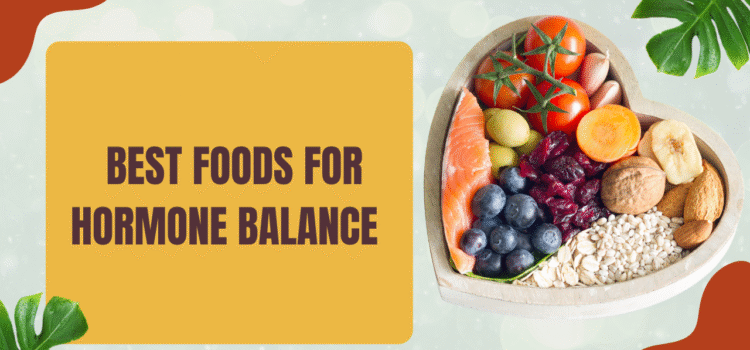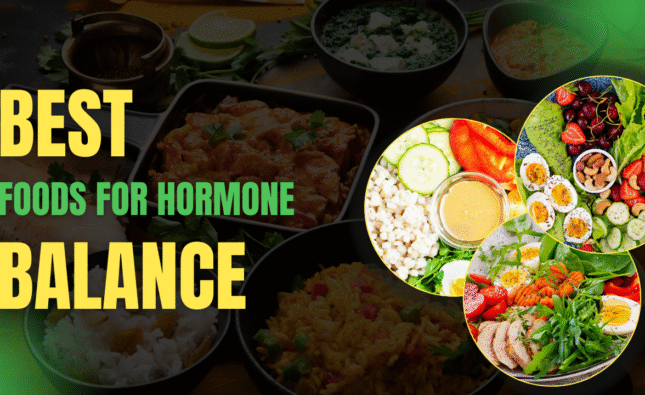
Best Foods for Hormone Balance: What to Eat for Natural Support
Hormones—like estrogen, cortisol, thyroid hormones, and insulin—play a major role in everything from mood and energy to metabolism and reproductive health. Hormonal imbalances affect millions of Americans, causing fatigue, irregular cycles, weight changes, and mood swings. Fortunately, the best foods for hormone balance can help restore harmony naturally.
🌱 Why Your Diet Matters for Hormone Health
-
Nutrients from whole foods support hormone production, sensitivity, and detoxification. A Mediterranean-style, high-fiber diet may reduce fasting cortisol and improve insulin sensitivity.
-
In the U.S., diet-related hormonal issues such as PCOS, thyroid dysfunction, and insulin resistance are prevalent. Making strategic dietary choices can ease symptoms and support long-term hormone harmony.
Top 8 Hormone-Supporting Foods
Leafy Greens & Colorful Vegetables
Rich in fiber, antioxidants, folate, vitamin C, and DIM (from crucifers like broccoli and kale), these foods support estrogen metabolism, blood sugar control, and adrenal health. A daily “rainbow plate” supports hormone signaling and reduces oxidative stress.
Fatty Fish & Omega‑3 Sources
Salmon, tuna, sardines, walnuts, chia seeds, and flaxseed deliver omega‑3s, vitamin D, and selenium—nutrients essential for hormone synthesis, reducing inflammation, and supporting thyroid and estrogen balance.
Nuts, Seeds & Legumes
Flaxseed and chia provide lignans and omega‑3s; sesame and sunflower seeds offer vitamin E and zinc. Men and women benefit from legumes and nuts for fiber, phytoestrogens, and steady blood sugar.
-
Seed cycling—flax and pumpkin seeds in follicular phase; sesame and sunflower in luteal—recent 2023 clinical trials show improved estrogen/progesterone markers in women with PCOS
Avocados & Olive Oil
These healthy fats provide cholesterol for hormone production—key precursors for testosterone, estrogen, progesterone—and help regulate cortisol, leptin, and ghrelin.
High‑Fiber Whole Grains
Oats, quinoa, lentils, brown rice, and barley support insulin regulation, estrogen excretion, and gut health. Fiber also increases satiety hormones and promotes a balanced metabolic response.
Lean Protein (Eggs, Chicken, Fish, Legumes)
Protein stabilizes blood sugar and supports peptide hormone synthesis. Eggs and lean poultry deliver B‑vitamins, iron, zinc, and B12—particularly vital for thyroid and reproductive health
Green Tea & Antioxidant-Rich Fruits
Green tea’s catechins and L‑theanine support cortisol regulation and calm focus. Fruits like berries and citrus provide antioxidants that reduce brain and adrenal oxidative stress.
Phytoestrogen-Rich Foods (Soy Products, Nuts, Legumes)
Foods like tofu, tempeh, soy milk, flax, and whole grains contain phytoestrogens (isoflavones, lignans) that may ease menopausal symptoms and support estrogen metabolism—especially in Western diets with low baseline intake.
US Specific Trends & Statistics
-
More than 50% of U.S. women experience menopausal symptoms, prompting a shift toward nutritional strategies like soy isoflavone intake (~40 mg/day from ~1.5 cups soy milk) for hot flash relief.eatingwell.com
-
Excess added sugar and ultra‑processed food consumption in the U.S. contributes to insulin imbalance, obesity, and hormonal disruption. Limiting sugar to ≤ 25 g/day aligns with AHA guidelines and supports hormone health.
Tips, Challenges & Expert Guidance
Challenges to Watch
-
Hormone fluctuations are natural—doctors aim for hormonal harmony, not flat “balance.” Food supports that harmony when paired with sleep, stress management, and movement.Women’s Health
-
Overeating processed foods, refined carbs, alcohol, or trans fats can impair hormone signaling and insulin sensitivity.
Practical Diet Tips
-
Follow Mediterranean-style meal patterns rich in whole grains, fish, veggies, and olive oil.
-
Practice seed cycling if managing menstrual symptoms or PCOS.
-
Include high-fiber and protein-rich meals to support stable blood sugar.
-
Hydrate, move daily, sleep 7–9 hours, and manage stress to reduce cortisol burden.
Expert Insight
-
Dr. Alex Robles (Columbia Fertility Center) notes that while foods like eggs and avocados won’t dramatically boost testosterone, deficiencies in nutrients like zinc and vitamin D can impair hormone production.
-
Functional-medicine experts at IFM emphasize that overall nutrition affects hormone sensitivity, not just blood levels, making food patterns and quality key.
Sample Hormone-Balancing Day Menu
-
Breakfast: Oatmeal with flaxseed, berries, walnuts, and Greek yogurt
-
Mid-morning snack: Apple slices with almond butter
-
Lunch: Grilled salmon, quinoa, spinach salad with avocado and olive oil
-
Afternoon snack: Green tea and a few almonds
-
Dinner: Lentil stew with broccoli, lean chicken, and mixed greens
-
Evening: Chamomile tea with cinnamon or soy milk latte (fortified with calcium and protein)
✅ Best Foods for Hormonal Balance
Getting your hormones into harmony involves more than pills—it starts on your plate. The best foods for hormonal balance—like leafy greens, fatty fish, nuts/seeds, whole grains, lean protein, and antioxidant-rich produce—work together to support hormone production, sensitivity, and detoxification. Coupled with sleep, stress reduction, and movement, these foods can help you feel calmer, more balanced, and energized.
Ready to feel better naturally? Start today by incorporating just one or two of these foods into your meals. Share your experience in the comments below, and don’t forget to subscribe for more evidence-backed nutrition tips and hormone-support strategies tailored for U.S. lifestyles!












